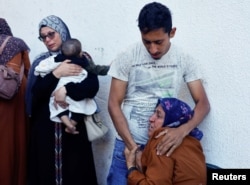Humanitarians and medical professionals working in the Gaza Strip warned Wednesday that a full-scale Israeli military operation in Rafah would be a catastrophe and said the safe, mass evacuation of civilians is not possible.
About 1.3 million Palestinians are sheltering in Rafah in southern Gaza after moving repeatedly from other parts of the strip to escape bombings and fighting.
On Monday, Israel dropped leaflets on a 30-square-kilometer area in eastern Rafah, telling residents to move to the coastal town of Al Mawasi, which the United Nations says is already overcrowded and lacking safety and essential humanitarian services.
Ghada Alhaddad, a spokesperson in Gaza for the British aid group Oxfam, said people do not know where to go, and tents are popping up all over Al Mawasi and in the central town of Deir al-Balah.
“Even on the sidewalks, on the pavement, on the streets, in the graveyards, in the courtyards of hospitals, in the courtyards of the schools — there are tents that are being built,” she told reporters on a briefing call with doctors and humanitarians from several aid agencies.
The population is so deteriorated after seven months of war, with many, including children, maimed by bombs or malnourished, that they are not healthy enough to relocate on foot — for most their only option.
“Children and elderly who are so starved that they can barely walk — these people cannot just pick up and walk and relocate to another area,” Alexandra Saieh, head of humanitarian advocacy and policy at Save the Children International, told reporters.
“The concept of a safe zone is a lie,” Helena Ranchal, director of international operations for French charity Medecins du Monde (Doctors of the World), said from Nablus in the West Bank. “There is not a safe area anymore in Gaza.”
She echoed the concerns expressed this week by many human rights advocates and aid workers about the Israeli-ordered evacuations — that civilians must be protected and have their basic needs met.
“All of these criteria were not met, and these displacements constitute forcible transfer in grave breach of international humanitarian law,” she said.
Malnutrition rising
Israel began targeting Hamas battalions in eastern Rafah on Monday, and also took control of the Rafah border crossing, which is the main humanitarian entry point into Gaza. It has been closed since.
Israel closed a second crossing, Kerem Shalom, after a Hamas rocket attack killed four Israeli soldiers on Sunday. It said the crossing had reopened on Wednesday, but the U.N. said no aid had passed through yet.
A third crossing, Erez, has been open only sporadically, humanitarians said.
Israeli Defense Minister Yoav Gallant told his troops Tuesday that the Rafah operation would continue “until we eliminate Hamas in the Rafah area and the entire Gaza Strip, or until the first hostage returns.”
Humanitarians say the shutdown of the border crossings and the halt to the entry of supplies, including fuel, could risk the near-term collapse of their aid operations, even without a full-scale military operation in Rafah.
“The whole aid operation runs on fuel. So, if the fuel is cut off, the aid operation collapses — and it collapses quickly,” said Jeremy Konyndyk, president of Refugees International. “That means water can’t be pumped, lights can’t be kept on in hospitals, vehicles can’t distribute aid.”
He said it comes as the threat of famine is growing across Gaza, not just in the north but also in central and southern Gaza.
“If there is a Rafah invasion, that will certainly push things past the tipping point, because then the aid operation will collapse, and then we will see really skyrocketing mortality related to famine,” Konyndyk said.
Doctors who have worked in Gaza agree.
British surgeon Nick Maynard has been to Gaza twice since the war started with British charity Medical Aid for Palestinians. He was evacuated from Rafah on Monday.
He told reporters he treated patients who had developed complications and severe infections that were the direct result of malnutrition, because they have weakened immune systems.
“I operated on many patients in the last two weeks who had awful complications from their abdominal surgery related to inadequate nutrition,” he said. “Particularly those with [their] abdominal wall breaking down. So literally, their intestines end up hanging outside.”
He said malnutrition directly contributed to the deaths last week of two young female patients, ages 16 and 18, both with survivable injuries.
“We will see far more of that over the coming months,” Maynard said.
Doctors and aid workers are also worried about the impending summer heat. A recent three-day heat wave saw temperatures hit 37 degrees Celsius (100 degrees Fahrenheit). They say clean drinking water is already in short supply, and severe heat will make dehydration a major contributor to deaths.
Already more than 34,000 Palestinians have been killed in the war, and more than 78,000 injured, according to the Gaza-run Health Ministry. Hamas killed 1,200 people in Israel during its October 7 terror attack.
The U.N. office for humanitarian affairs said Wednesday that all the main medical facilities in Rafah could soon become inaccessible or inoperable. One of the three hospitals in Rafah — Al-Najjar — was vacated Tuesday because it is located in the area under the current evacuation order.
The World Health Organization said Al-Najjar has the only dialysis department still operating in Gaza — a lifeline for 200 patients with kidney failure.
The humanitarians stressed that the only way to help everyone in need is for the fighting to end.
“The solution — and we are asking for that since the beginning — is a cease-fire,” Ranchal of Doctors of the World said. “A cease-fire now.”



